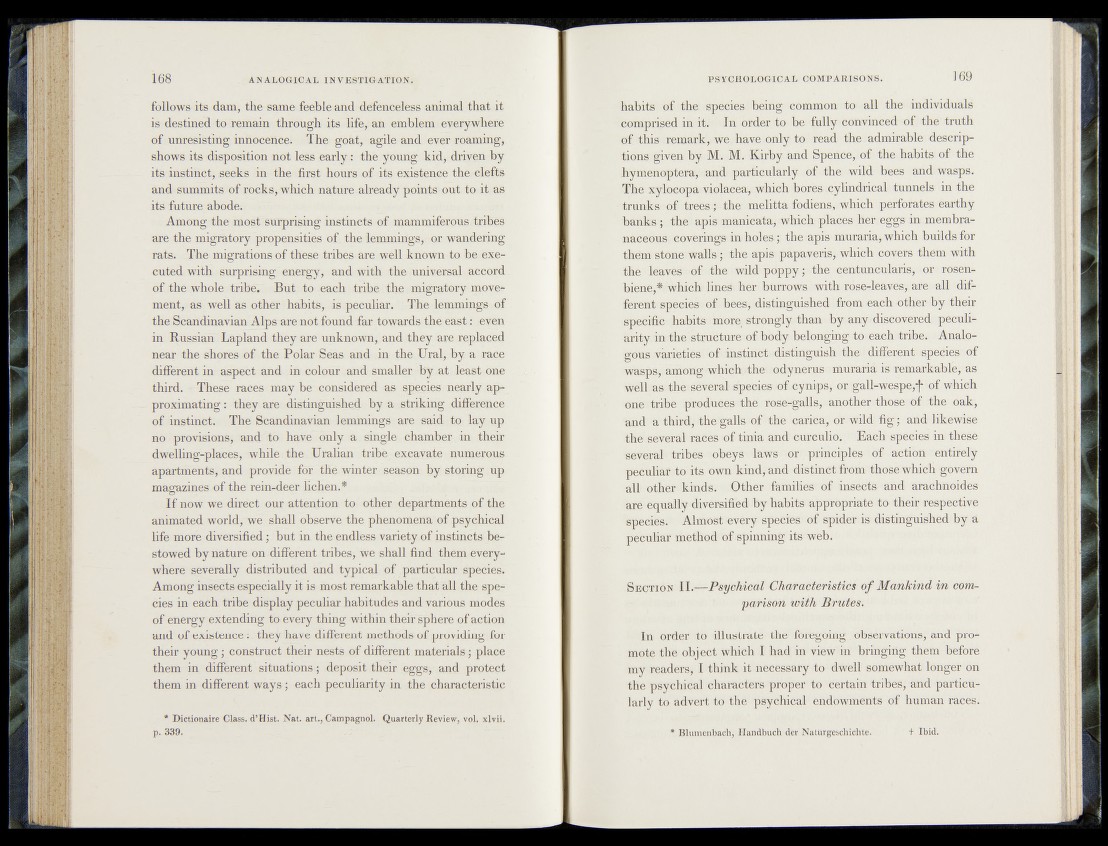
follows its dam, the same feeble and defenceless animal that it
is destined to remain through its life, an emblem everywhere
of unresisting innocence. The goat, agile and ever roaming,
shows its disposition not less „early : the young kid, driven by
its instinct, seeks in the first hours of its existence the clefts
and summits of rocks, which nature already points* out to it as
its future abode.
Among the most surprising instincts of mammiferous tribes
are the migratory propensities of the lemmings, or wandering
rats. The migrations of these tribes-are well known to be executed
with surprising'energy, and with the universal, accord
of the whole tribe. But-to each tribe the migratory movement,
as well as othér habits, is peculiar. The lemmings of
the Scandinavian Alps are not found far towards the east : even
in Russian Lapland they are unknown, and they are replaced
near the shores of the Polar Seas and in the Ural, by a race
different in aspect and- in colour and smaller by-at least one
third. • These races may be considered as species nearly approximating
: they are distinguished by a striking difference
of instinct. The Scandinavian lemmings are said to lay up
no provisions, and to have only a single chamber in their
dwelling-places, while th e . Uralian tribè^ excavate numerous
apartments, and provide for the winter season by storing up
magazines of the rein-deer lichen.*
If now we direct our attention to other departments sof the
animated world, we shall observe the phenomena of psychical
life more diversified ; but in the endless variety of instincts bestowed
by nature on-different tribes, we shall find them everywhere
severally distributed and typical, of .particular species.
Among insects especially it is most remarkable that all the species
in each tribe display peculiar.habitudes and various modes
of energy extending tô every thing within their sphère pf action
and of existence :. they have different methods of providing for
their young ; construct their nests of different materials ; place
them in different situations ; deposit their eggs, and protect
them in different ways; each peculiarity in the characteristic
* Dictionaire Class. d’Hist. Nat. art., Campagnol. Quarterly Review, vol. xlvii.
p. 339.
habits* of the ■ speciesj being common to all the- individuals
comprised in itb In order.'to,>be fully convinced-of the truth
pf ithis remarky we- have,only to read1 the,admirable descriptions
givens by Mv Kirby and Spertoeyof the habits of the
hymenoptera; - and- parrieularly^f^h^kwild t-bfe^-: and wasps.
The xylC®opavi©|acesy which bore&iQylindrical- tunnels m the
trunks of- r^eb ^ jitfem elitta fodfeiis, .which1 perforates earthy
banks-; th e " apis -manioata, whicb^pl'aces'-herieggsdn membranaceous,
coverings inikole^;1 t h e s i s muraria* which buildsfor
thdm stone walls.; the apis; papaveris;, w h i c h t h e m with
the leay§|oof • the wild poppy; .the ceotnncMlarisy-idM-rosem
bienfe,* which Tines? her j burrows with- rdseT'@hvds|Sfaie< • all different
speeiesi of:-bees; AistingmshedTfi?om- each oth;ept% their
Sperifio^ihafeits - morefStronglythanw by^any^disfbyered peculiarity.
in the '-structure:;o£ b©dy beion^g&tdeach tribe. Analogous
varieties. of instinct- distinguish the i different-.
waspsy aiSong-which/theGodynerus muraria is remarkabley as
well as-thetseveraWpeoiessicEfitcynips-, or gall-wespe^?of which
one tribe prodnees the rose-galkyfe another-those; of the dak,
and a third, the%ails:Of the carica, or wild fig; and likewise
the several radcSiof tirria and curculio.' -E a e b species imthe&e
fcdveraT t r i b e s l aws* ' o f ^Kpr ihM| j l ^ - J-of .^tibj&tfentirely
peculiaf to its own kind, and distinct from thoMWhich govern
alk-Gther kinds. Other families of insects aiid arachnoid^
are equally diversified by habits- appropriate to their r^pettive
species. Almost every species of spite* is distinguished by2 a
peculiar method of-spinning its web.
S ection I I .— Psychical Characteristics o f Mankind in comparison
with Brutes,
In order to illustrate the foregoing observation's, and promote
the object which I had in view in brihgifig them-before
my readers, I think it necessary to dwell- somewhat longer on
the psychical chaiacters proper to certain tribes, and particularly
to advert to the psychical endowments of human races.
* Blumenbach, Handbuch der Naturgeschichte. t Ibid.